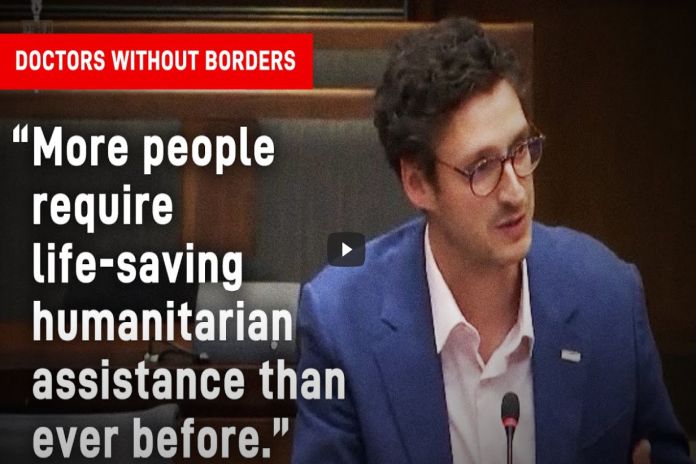Dear Caribbean
We are at a staggering moment in human history: there are more people around the world today forcibly displaced from their homes than any other time in modern history. Yet, while more people need vital humanitarian assistance than ever before, we are also witnessing alarming gaps in responses to large crises of people facing forced displacement.
On October 29, I spoke in Ottawa before the parliamentary subcommittee on international human rights. I talked as a member of Doctors Without Borders/Médecins Sans Frontières (MSF) about three specific crises with elements of forced displacement — each one distinct but all characterized by slow global action despite massive humanitarian needs:
- Sudan: Since conflict engulphed the country in April 2023, displacing millions, hundreds of thousands of civilians are facing immense suffering, including malnutrition, trauma and lack of basic healthcare. Earlier this month, MSF was forced to stop outpatient treatment for 5,000 children with acute malnutrition in Zamzam displacement camp in North Darfur because warring parties have blocked deliveries of food, medicines and other essential supplies.
- Eastern Democratic Republic of Congo (DRC): in North Kivu province, hundreds of thousands of internally displaced people need food, shelter, drinking water and protection from sexual violence amid ongoing violent conflict. In 2023, MSF-supported clinics provided care to two survivors of sexual violence every hour.
- The Rohingya crisis: Over one million Rohingya people who have fled violence and persecution live in overcrowded, unsanitary refugee camps in Cox’s Bazar, Bangladesh. MSF is the main provider of medical care in the camps. A recent MSF survey revealed almost one in five people tested for hepatitis C had an active infection but lack of healthcare means many will miss out on treatment and being cured.
More than 300 million people today find themselves caught in humanitarian crises and in need of assistance.
What can Canada do?
People’s lives are further endangered by attempts by states and others to contain, deport and deter them from seeking safety in other countries. Canada should not only be responding to these humanitarian and political crises but should be denouncing policies that prevent people from escaping situations of violence and deprivation, and that increase their vulnerability.
In DRC, in Sudan, in Bangladesh, and beyond, minutes matter for people forced to flee their homes, and humanitarian assistance can make the difference between life and death.
MSF will continue to respond, but humanitarians cannot stop wars, humanitarians cannot lift blockades and humanitarians cannot prevent the crises that today are driving alarming numbers of people to be displaced.
As I shared with the committee, Canada has the voice and power to act decisively, a voice that needs to be fully engaged in addressing the problems that are today fuelling these humanitarian crises. We hope Canada can find the political will and moral courage to continue to step up.
Thank you for sharing our belief that everyone has the right to humanitarian assistance including critical medical care, whoever and wherever they are.
With gratitude,
Jason Nickerson
Humanitarian Representative to Canada
Doctors Without Borders/Médecins Sans Frontières (MSF) Canada





